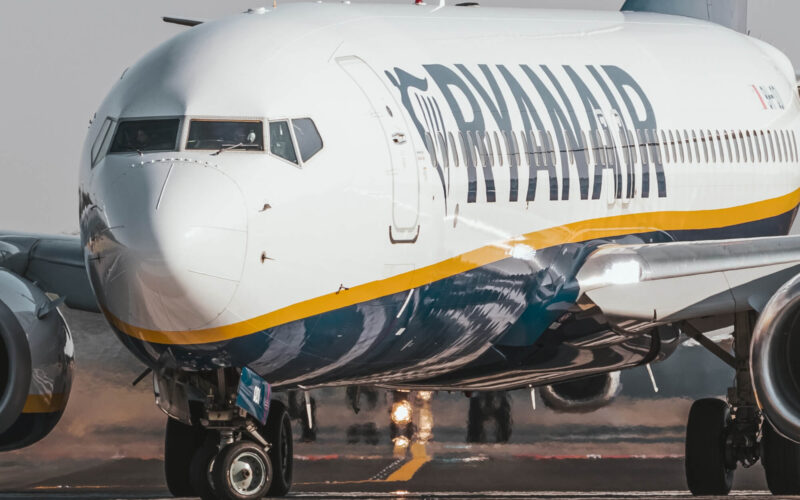Ryanair says it will need to continue offering discounted ticket prices to encourage people to travel at the start of 2022 after the Omicron variant of COVID-19 hit air travel demand.
Europe’s largest airline by passenger numbers cut its planned January schedule by one-third after governments imposed Omicron-related traffic restrictions. In its third-quarter results statement on January 31, 2022, the Irish low-cost carrier said the variant “badly damaged” bookings, load factors and yields (revenue earned by ticket and mile flown) in December and January.
“We saw a collapse in close-in bookings, and weaker yields,” group chief executive Michael O’Leary said in a video statement. He said the impact on yields was also continuing into February and that pricing would remain “very sensitive” to news flow on the virus.
“We can see traffic recovering in February and March but remain nervous about what the yield is. We will spend money to fill our planes in the near term,” O’Leary added.
European network manager Eurocontrol said that in the first 26 days of January, network traffic dropped to 69% of 2019 levels, a sharp fall from November and December 2021, when it was running at 77-78% of pre-crisis levels.
Coming towards the end of the month & the impact of #Omicron is all too clear, with traffic (1-24 Jan) 30% down on 2019, near the low scenario of our forecast. Anticipate this will be short-lived.@Transport_EU @ECACceac @IATA @A4Europe @eraaorg @EBAAorg @ACI_EUROPE @CANSOEurope pic.twitter.com/2dDkb85vVK
— Eamonn Brennan (@eurocontrolDG) January 25, 2022
The effect of Omicron means Ryanair is remaining cautious for its 2022 financial year, which runs until March 31, 2022. In its third quarter to December 31, 2021 it reported a net loss of €96 million ($107 million).
For the full financial year, it expects a loss of between €250m to €450m ($279-$503 million), a wider than usual range for this time of the year due to the uncertainty caused by COVID-19.
“Omicron was a very unwelcome development and we would caution there will be other variants and challenges arising out of COVID-19 that we will have to address,” O’Leary said. “Being cautious is the most sensible way going forward.”
Still, like European budget rivals easyJet and Wizzair, it is hoping for a strong summer in terms of bookings, though says profits will take longer to recover.
Ryanair said its summer 2022 capacity is currently planned to be at 115% of summer 2019 levels.
“We expect a strong-bounce back in summer 2022, albeit maybe at lower yields, as people who have been locked up for the last two years return to traveling and going on holidays,” O’Leary said.
Will Ryanair order more MAX?
The Irish carrier has so far received delivery of 41 Boeing 737 MAX aircraft and expects it will have 65 in its fleet for the peak summer season. Chief financial officer Neil Sorahan said it was seeing opportunities to grow where other airlines had retreated and governments were keen to stimulate tourism in their countries.
However, O’Leary said Ryanair was not in talks at the moment with Boeing on new aircraft orders.
“We’ve been disappointed with the response from Boeing, we’re disappointed for Boeing too that we’ve seen a number of Boeing customers like Jet2 convert to Airbus,” the CEO said. “We think Boeing are missing a trick. They need to be much more aggressive on the sales front, they need to be doing a deal with Ryanair but sadly they’re not.”
One area where Ryanair was bullish was on its fuel hedging strategy. Airlines hedge fuel to protect them from increase in oil prices, though European carriers tend to do this more than US rivals.
The Irish airline said it was fully hedged on fuel requirements for its fourth quarter, and 80% hedged for the first half of the next financial year, which starts on April 1, 2022, thus protecting it from a recent increase in jet fuel prices.
“Ryanair’s very strong and sensible hedging policy will deliver significant savings for all our customers and shareholders at a time when many airline competitors have unwisely reduced or abandoned sensible hedging strategies,” it said, in what could be a dig at rival Wizzair.
Wizzair decided to stop hedging during the pandemic to avoid over-hedging. Hedging the cost of fuel in advance allows airlines to better control their fuel costs, although they can be expensive to unwind and can mean airlines lose out if the fuel drops sharply. When the COVID-19 pandemic hit, several airlines in Europe took financial hits due to the cost of unwinding fuel hedges that they no longer needed.

